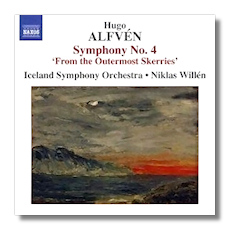
The Internet's Premier Classical Music Source
Related Links
- Alfvén Reviews
- Latest Reviews
- More Reviews
-
By Composer
-
Collections
DVD & Blu-ray
Books
Concert Reviews
Articles/Interviews
Software
Audio
Search Amazon
Recommended Links
Site News
 CD Review
CD Review
Hugo Alfvén

Orchestral Works
- Symphony #4 "From the Outermost Skerries", Op. 39 (1919)
- Festival Overture, Op. 52 (1944)
Arndis Halla, soprano
Johann Valdimarsson, tenor
Iceland Symphony Orchestra/Niklas Willén
Naxos 8.557284 58:12
Summary for the Busy Executive: Northern sketch.
Hugo Alfvén may be the most popular Swedish composer in Sweden. And why not? Marvelous tunes in sumptuous Straussian orchestrations characterize him at his best. Unlike someone like Sibelius, Stenhammar, or Nielsen, however, Alfvén's music lacks a strong intellectual or architectural component. Listeners usually don't have to fret over whether they will "get it."
The Fourth Symphony, in four movements played without breaks, is a case in point. In a basically Wagnerian idiom, the work proceeds pictorially and dramatically more than argumentatively. Alfvén, incidentally, also painted, and to me his music brims with pictures. He'd have made a fine film composer.
Combining tone poem and symphony, the Fourth tells the story of a failed love affair: the boy's longing in the first movement; the awakening of love in the girl in the scherzo second; the growth of the couple's love in the slow movement; and the finale recounting the tragic ending. To drive home the point, Alfvén includes a soprano and a tenor in wordless melody, giving us the dramatic effect of opera without the messy obstacles of a decent libretto and workable stagecraft. The drama works itself out along Wagnerian principles, with Leitmotiven for the boy, girl, and, of course, dat ol' debbil sea. You don't bother with first and second subjects, exposition, development, and the like. You just give yourself over to the story and the atmosphere. The symphony will drive you nuts if you expect Sibelius. Yet, at an elemental level, the score not only works, but stands as one of the composer's best. From the opening measures, Alfvén hooks you with a gorgeous evocation of the sea at night and moves on with a sure sense of musical rhetoric and drama.
The Festival Overture has no specific programmatic intent and definitely points to Alfvén's lighter side, with heavier Swedish folk inflections in the themes. The inventive, kaleidoscopic orchestration stands out, dressing an almost comical theme for various roles: rustic, hero, lyric poet, and so on. At times, you may think yourself in the middle of Strauss's Don Juan or Eulenspiegel, but it's not a simple matter of Alfvén cribbing. He really does regard music in much the same way Strauss does – something that evokes pictures in the mind, and, in both cases, fairly grand pictures at that.
Willén and his Icelanders give loving performances of both works. The singers sound, appropriately, Romantically lost and lonely – what some young, inexperienced people aspire to as proof of love.
Copyright © 2008, Steve Schwartz




















